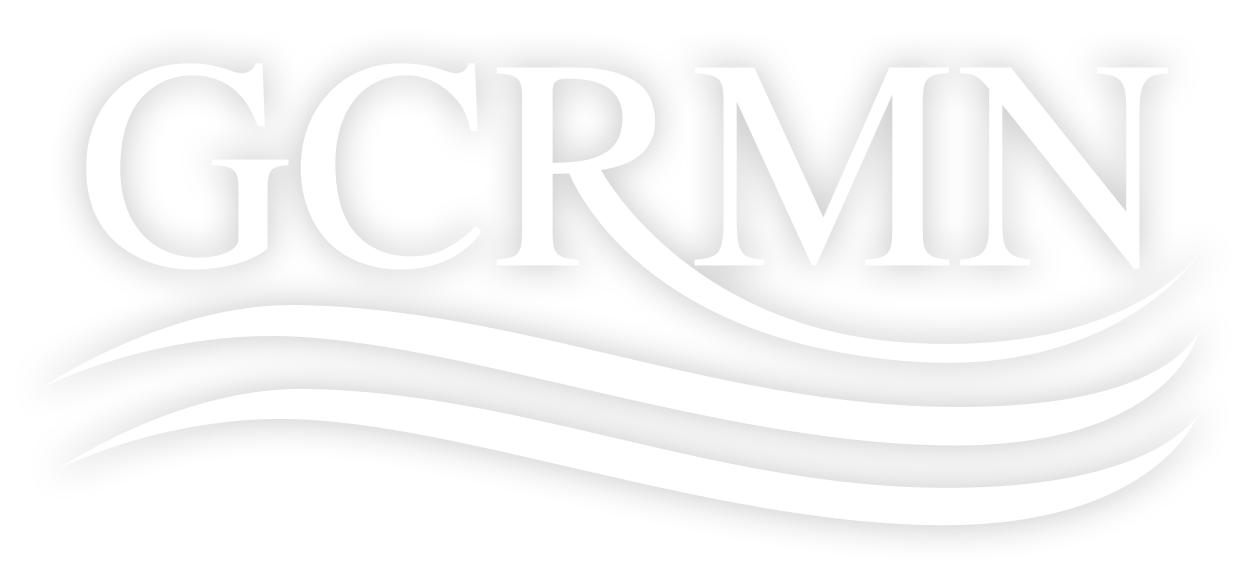The GCRMN is structured in ten regional nodes, which operate as independent entities around a regional coordinator. These node coordinators facilitate the communication within the region, workshops on monitoring and data management and contributions to global and regional GCRMN “Status and Trends of Coral Reefs” reports. Regional node coordinators interact with the GCRMN Core Team and most are represented in the GCRMN Steering Committee.
To improve the communication between node coordinators, a GCRMN regional node online meeting was held on 6th July 2023. There was general agreement to have such meetings on a regular basis, to improve sharing of information between the region on current initiatives, experiences with implemented solutions and challenges encountered.
In this first meeting the coordinators of each of the ten regions presented updates of the activities in their nodes, which are summarized below.
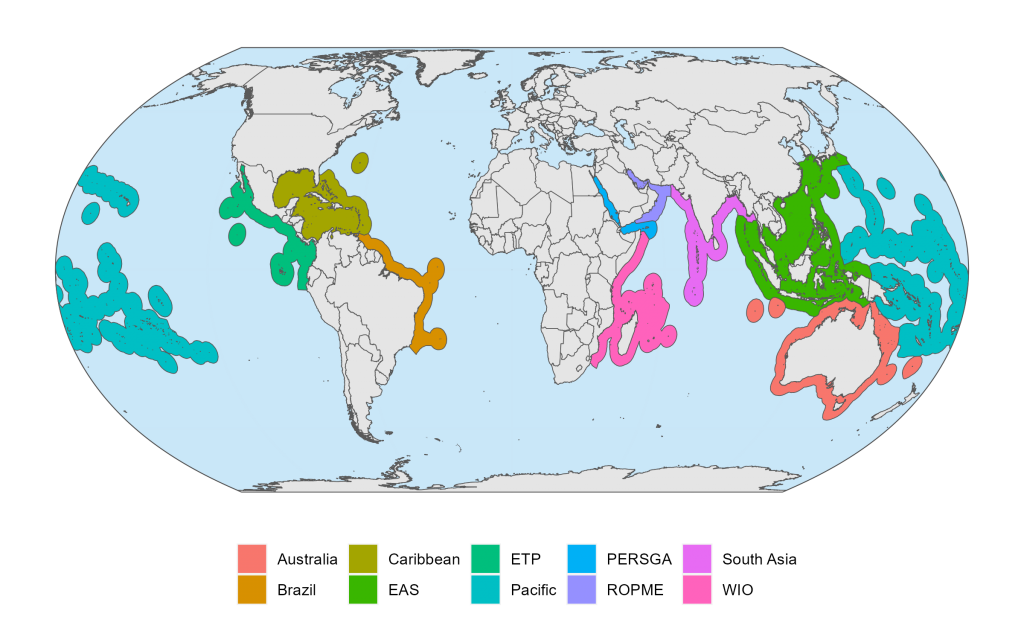
Australia (Britta Schaffelke)
A collaborative project between AIMS, University of Queensland, and James Cook University was recently completed that developed a new analytical framework to improve the reporting of Australian coral reef monitoring data. The goal was to create a composite index for the condition of Australian coral reefs, integrating five indicators (hard coral cover, macroalgae cover, community composition, recovery performance, and coral juvenile density). Ecological models underpin bioregion-specific computations. The composite index can be presented in an intuitive way using an interactive data dashboard, allowing to rapidly access data visualizations as well as interpretated assessment summaries.
Brazil (Beatrice Padovani Ferreira and Ana Paula Prates)
Brazilian coral reefs are affected by land-based impacts, by marine heatwaves which led to severe coral bleaching in 2020, and by invasive species such as lionfish (Pterois spp.). In terms of monitoring, initial efforts were mainly driven by researchers and universities, and were structured from 2002 as a national effort. Long-term monitoring was implemented on International Long Term Ecological Research (ILTER) sites as well on NGO projects’ sites. In the next years, Brazilian coral reefs monitoring can potentially benefit from the National Secretariat for Climate Change as well as the Global Fund for Coral Reefs (GFCR) for which a Brazilian program is under development.
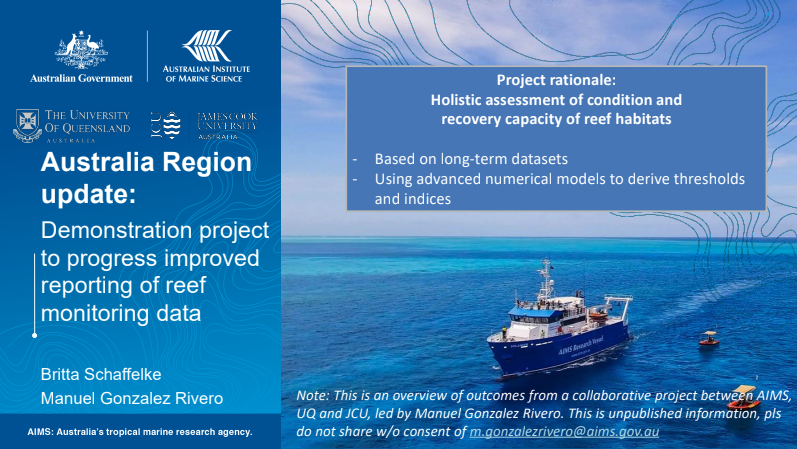
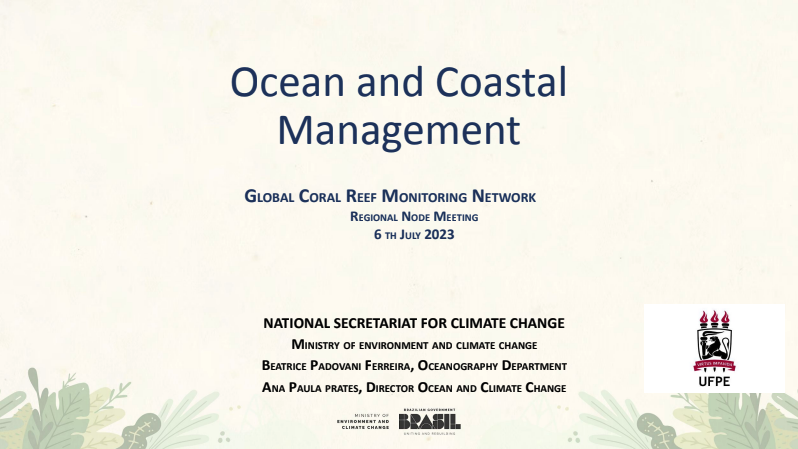
Caribbean(Melanie McField and Christophe Blazy)
The GCRMN Caribbean node has recently approved a new work plan for 2023-2024, focusing on data collection and data analysis. Based on an online survey, the main priorities for members of the Caribbean node are to improve the capacity building for biophysical and socio-economic monitoring, and to enhance data management. Three working groups will be put in place, one on capacity building and training, one on data management and one on communication. Regarding the latter, a GCRMN-Caribbean Facebook webpage has been created. Over the next two years, the Caribbean node will organise a workshop on integrated reef monitoring and depending on funding, the region aims to develop a regional database for images from reef monitoring photo-quadrats and to publish a new regional report.
East Asian Seas (Tadashi Kimura)
The East Asian Seas GCRMN region includes 14 countries and states and is divided into two sub-regions, East & Northeast Asia and Southeast Asia. Recently a new GCRMN East Asian Seas report has been published, in addition to a scientific article (see Communications Biology). A GCRMN East Asian Seas workshop has been held in parallel to the 5th Asia-Pacific Coral Reef Symposium, in Singapore from June 17-18, focusing on regional issues, future activities, and networking. The members of the GCRMN East Asian Seas region have developed a timeline for next activities, with potentially new regional reports for 2026 and 2030. In the meantime, some challenges remain such as data storage and management, as well as data analysis for which a new chief analyst is required (Dr. Samuel Chan left this position recently).
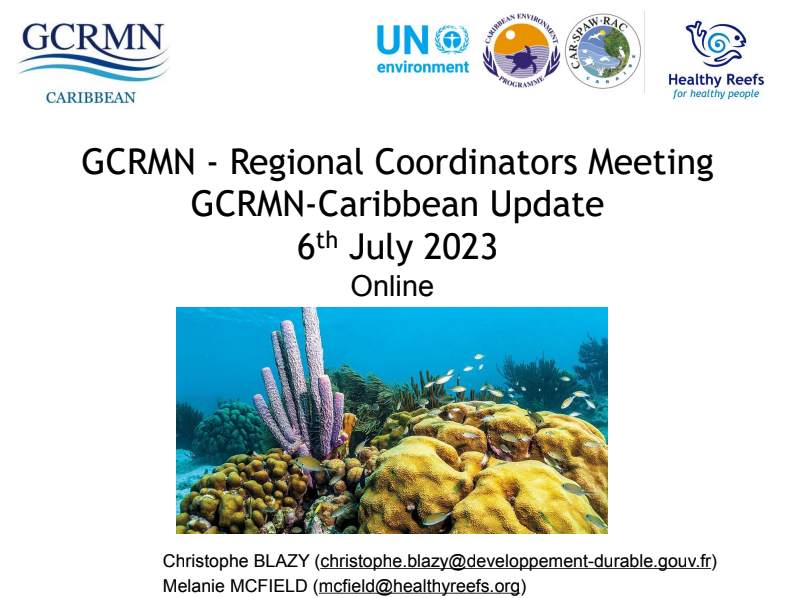
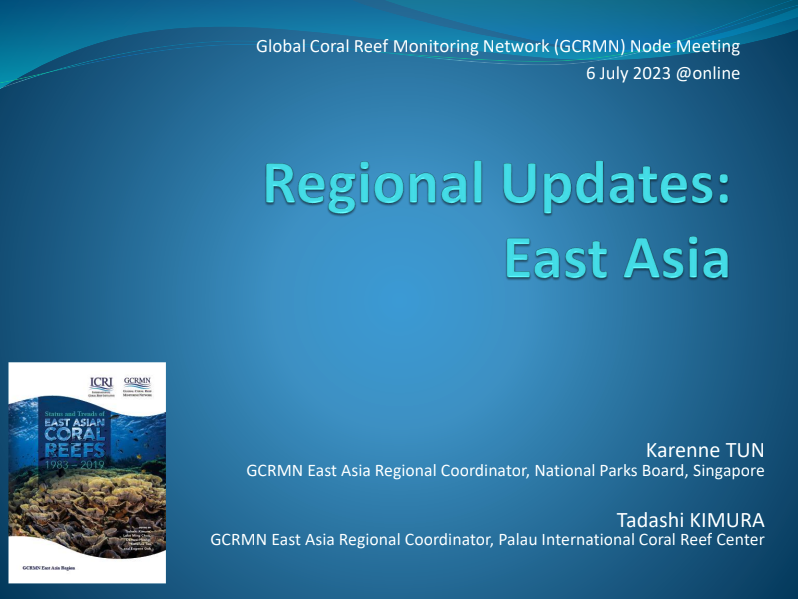
Eastern Tropical Pacific (Hector Reyes Bonilla, and Sonia Bejarano)
Like most of the GCRMN regions, the networking activities of the Eastern Tropical Pacific node suffered from the restriction due to COVID-19 pandemic. However, members of the node recently meet in Cali, Colombia, from June 26 to July 1st, to discuss about future activities of the node, particularly related to the effect of climate change on coral reef biodiversity. During this workshop, the participants defined a standardized monitoring protocol that will be used in the six countries of the region. Recently, abnormally high sea surface temperatures were measured over the region, likely associated with entry into a new El Nino phase of ENSO, and some coral bleaching has already been observed.
Pacific (Jérémy Wicquart)
The production of a new GCRMN Pacific regional report is currently underway and will be published in early 2024, six years after the last regional report. Like previous regional GCRMN reports, this new report will be structured in three main section, with an executive summary, a summary for the entire Pacific region, and a section dedicated to the trends of coral reef of each territory (i.e. economic exclusive zones). Geographic and socio-economic information will be reported, in addition to climatic disturbance events (marine heatwaves and tropical storms). Such information will provide the context to interpret estimated trends in hard coral and algae cover. Importantly, this new report will provide an opportunity to test the new data integration approach for the GCRMN reports (see gcrmndb_benthos).
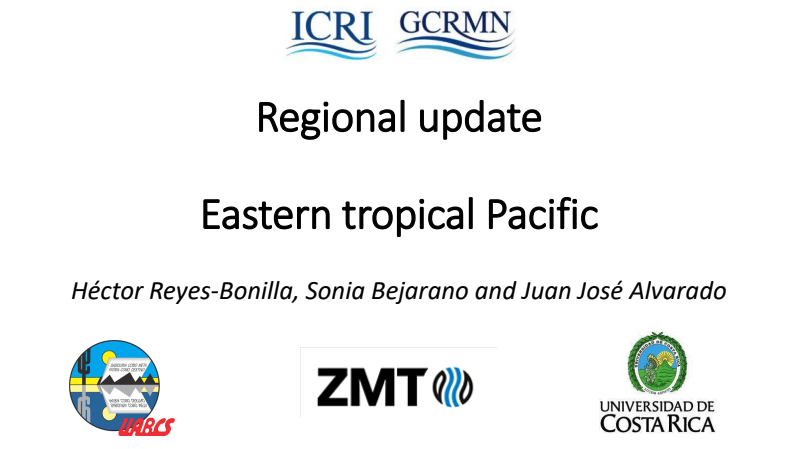
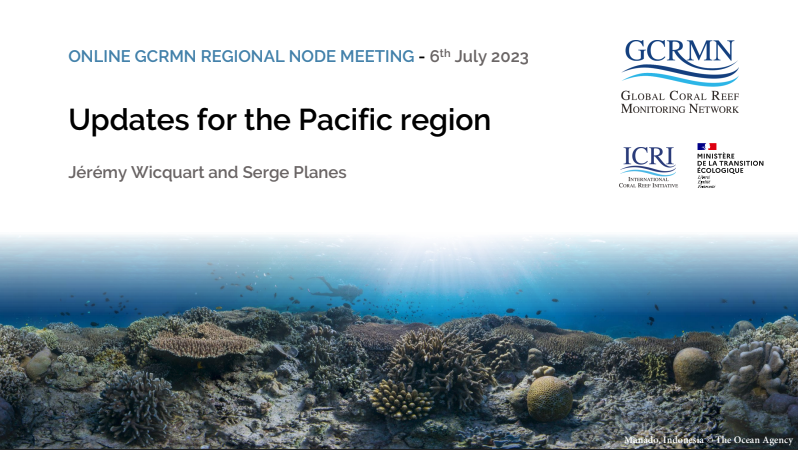
PERSGA (Maher Amer)
A regional meeting was organized to discuss and to collect information on the currently observed mass mortality of the long spine black sea urchin (Diadema sp.), and to prepare a response plan, which may include captive breeding to restock this key species. Multiple stakeholders were represented, scientists, policy makers, MPA managers, fishers, and diving tourism operators. In addition, a new project dedicated to sustainable fisheries has been launched in 2023 aiming to enhance protection of charismatic marine megafauna such as sharks, turtles, and marine mammals. Priority areas for the restoration of coastal fish habitats like mangroves, seagrass meadows and coral reefs will also be defined in the frame of this project alongside of the implementation of long-term monitoring.
ROPME (John Burt and Jeneen Hadj-Hammou)
Like most of the GCRMN regions, ROPME face different challenges regarding monitoring data such as the limited number of long-term monitoring sites, limited data accessibility or meta-data availability. To address these issues, a regional workshop (Northeastern Arabia Reef Monitoring Network workshop) has been held in May 2023 in the New York University of Abu Dhabi. The 30 participants discussed about historical monitoring data, new data management tools (ReefCloud and MERMAID), and data collection. The goals of the workshop were to share experience and skills, to collectively design a regional monitoring program based on a standardized protocol, and finally to collect historical data into a regional database. Participants agreed on the publication of a data paper for such regional database, which can be used to produce future GCRMN reports.
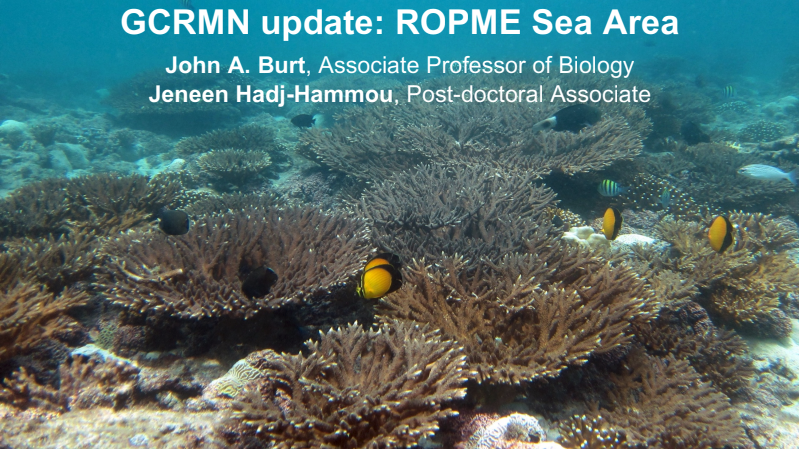
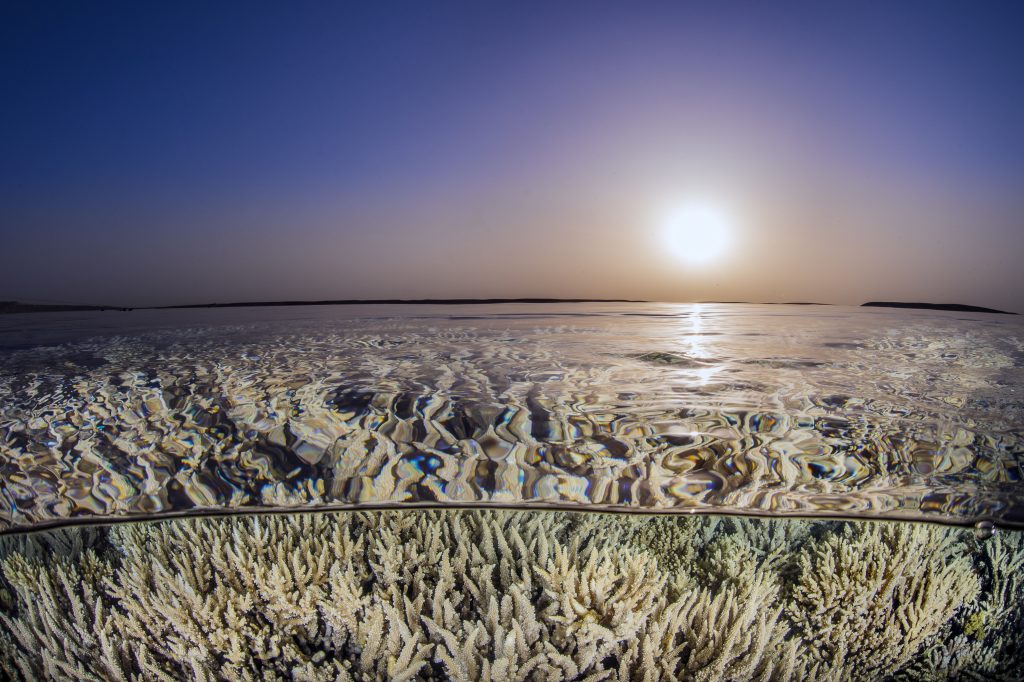
South Asia (Md Masumur Rahman)
Coral reefs of the South Asia GCRMN region (which includes 5 countries) have been impacted by mass bleaching events in 1998 and 2016, but also face additional threats such as sedimentation, invasive species, coastal pollution, and destructive fishing practices. This led to a decrease in hard coral cover and increase in algae cover in the region (Status of Coral reefs of the World:2020 report. The region plans to re-activate the South Asia Coral Reef Task Force (SACRTF) and to revitalise the links to the GCRMN.
Western Indian Ocean (Swaleh Aboud, Karin Moejes)
Since 2021, the GCRMN Western Indian Ocean region members have published a regional IUCN Red List of Ecosystem index which has led to the publication of a scientific article in the journal Nature Sustainability. In addition, the region has organized an online data training course to train participants in data management, data analysis, and data visualization of coral reef monitoring data using the R software. From March 1st to 3rd 2023, the region organized a Coral Reef Task Force workshop in Moroni, Comoros, to discuss coordination, data management, reporting, and communication, but also to promote coral reef restoration and reactivate the socio-economic monitoring initiative. Recently a new coordinator of the Western Indian Ocean GCRMN region, Dr. Karin Moejes, has been nominated. Dr. Karin Moejes will assist David Obura in the coordination of this node.
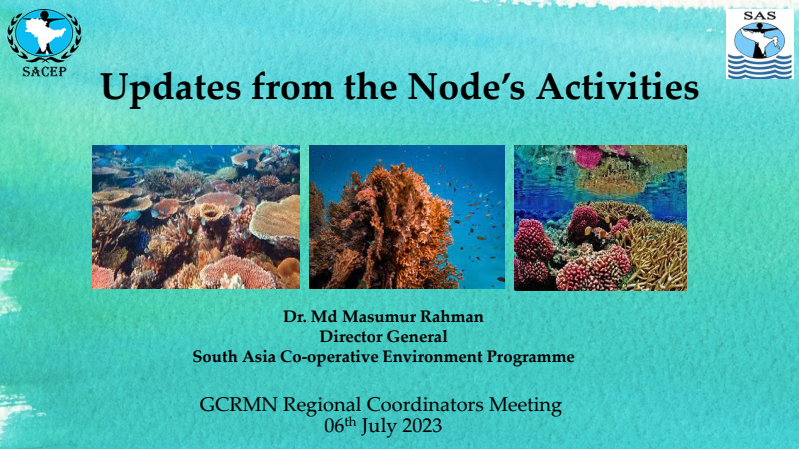
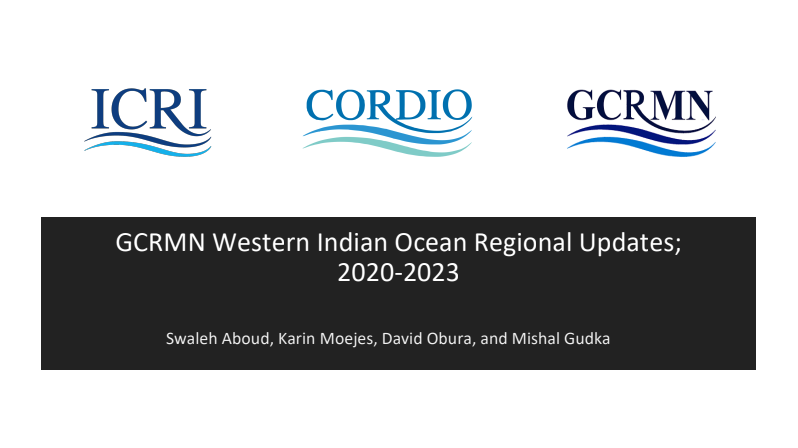
Finally, in addition to these regional updates, the consultation about the next GCRMN global report was initiated. The node coordinators have been invited to provide their ideas and comments regarding scope, format and timeframe by email. This feedback will support more in-depth discussions during the upcoming in-person GCRMN Steering Committee meeting in Kona, Hawai’i, in September.
